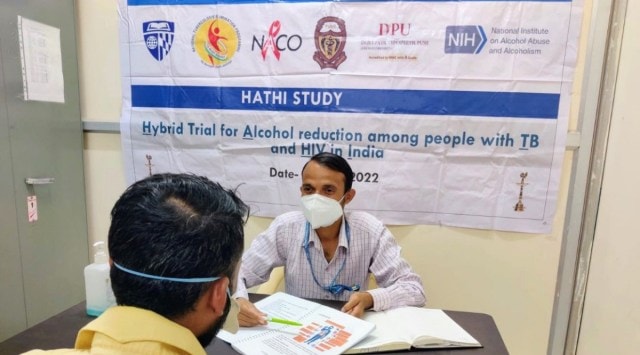Click here to join Express Pune WhatsApp channel and get a curated list of our stories
Pune study raises hope for patients with crippling triple burden – HIV, TB, alcohol
The key aims of the trial are: generate evidence for HIV and TB programmes to integrate alcohol reduction counselling; bring about behavioural changes to ensure lower alcohol intake.
 A counsellor at the BJ Government Medical College in Pune. (Express)
A counsellor at the BJ Government Medical College in Pune. (Express) Doctors and researchers are keeping their fingers crossed on a five-year clinical trial, which commenced in two Pune hospitals in 2021, that aims to tackle a crippling triple burden among TB patients: HIV, TB and alcohol-use disorder — a combination that, they say, is disastrous for an already weakened immune system.
Funded by US-based National Institute of Alcohol Abuse and Alcoholism, the Hybrid trial for Alcohol reduction Among people with TB and HIV in India (HAATHI) is being conducted at B J Government Medical College & Sassoon General Hospital, and Dr D Y Patil Medical College, Hospital and Research Centre.
Its key aims: generate evidence for HIV and TB programmes to integrate alcohol reduction counselling; bring about behavioural changes to ensure lower alcohol intake.
But the big challenge, say researchers, is to convince patients to enrol for the trial, which hopes to cover 450 persons but has only 120 involved at present.
“Our work demonstrates the high prevalence of unhealthy alcohol use among patients with TB, and that it is one of the major reasons for treatment default, failure, and mortality… These patients face stigma from family and society, mental health issues and non-adherence to medication,” said Dr Nishi Suryavanshi, deputy director, B J Government Medical College-Johns Hopkins University Clinical Research Site, and lead investigator from Johns Hopkins India.
With Dr Amita Gupta and Dr Geetanjali Chander as principal investigators from Johns Hopkins University USA, the study has been exploring if Cognitive Behavioral Therapy – Motivational Enhancement Therapy, where patients and counsellors develop a plan for behavioural change, can help reduce alcohol use.
“Our hypothesis is that compared to usual care, HAATHI intervention may result in greater reduction in drinking days, heavy drinking days, and number of drinks per drinking day,” Suryavanshi said.
“These persons are usually from the low socio-economic income group whose daily income varies. Once infected with both TB and HIV, there is a sense of helplessness and they continue drinking. This is why our trial is so important,” said Dr A L Kakrani, professor of clinical eminence and director of academic collaboration, who is the lead investigator from Dr DY Patil Medical College, Hospital and Research Centre.
According to WHO’s Global TB report (2022), India’s estimate of TB cases attributable to select co-morbidities in 2021 included 2.58 lakh people with harmful levels of alcohol consumption apart from malnourishment, smoking, diabetes and HIV.
In Pune, data shows 124 people died in 2020-2023 due to HIV-TB co-infection and related problems. Dr Sanjay Darade, Pune district TB officer, said that in 2020-2022, 53 such deaths were registered across 13 tehsils. In 2021-2023, 34 such deaths were registered in Pune city and 37 in Pimpri Chinchwad.
The Pune study has been replicating the trial design of a similar exercise in Vietnam but with culture specific changes, says Dr Niteen Abhivant, who heads the department of psychiatry at BJ Government Medical College and Sassoon General Hospital. “Excess alcohol use leads to distorted thinking and four counselling sessions are conducted to motivate the participants to reduce intake,” he said.
“If these counselling interventions are found to be effective, efforts will be made for advocacy to integrate it into HIV and TB clinical care settings,” said Dr Rohidas Borse, who heads the department of medicine and is leading the study at BJ GMC.
Click here to join Express Pune WhatsApp channel and get a curated list of our stories








